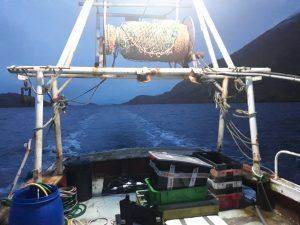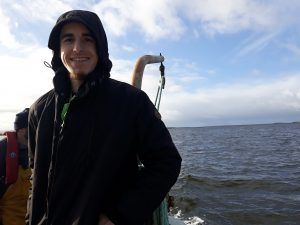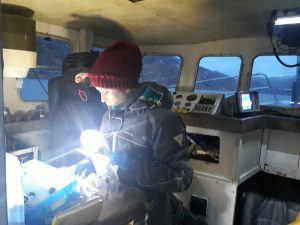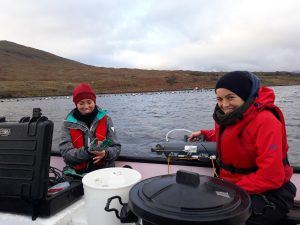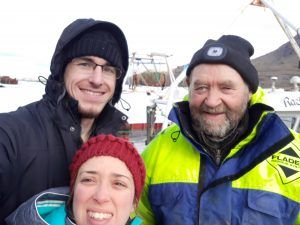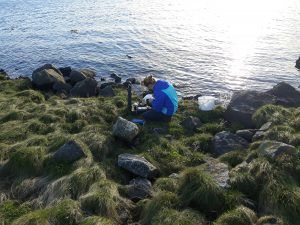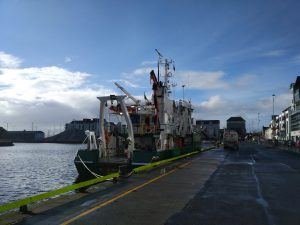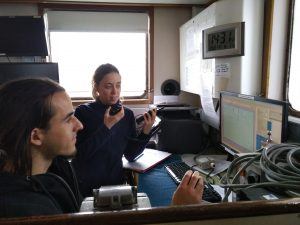Profile
Maxime Savatier
My CV
-
Education:
UniLaSalle Beauvais (France), Cranfield University (United Kingdom), Trinity College Dublin (Ireland)
-
Qualifications:
MSc, PhD (in progress)
-
Work History:
Consultancy, University Teaching
-
Current Job:
PhD student
-
About Me
Curious and open minded. I like to think that anyone or anything can teach you something.
-
Read more
I live in Dublin, sharing a large house with people from all around the world. As soon as something happen somewhere in the world, I have a first hand opinion from someone from there. I have the privilege of coming home every day to a global family! Born in the South of France, my curiosity and will to learn made me move to Paris, then to the UK, and now to Ireland. I love to sing in a choir, play music, hike and cycle around town – when I am not busy doing research, that is! My girlfriend is Brazilian and a diplomat in the making.
-
Read more
If I ask you: where does the water that flow to the sea mainly comes from, what would you answer?
From rivers?
Until recently, most scientists also thought that rivers were bringing most of the water and nutrients coming from land to the sea. Nutrients are the elements used by plants and algae to grow, they are in most of the food you eat and they drive the best part of life on earth and at sea. Without enough of them, you can’t have life in the sea; too much of them, then the environment changes and this starts affecting our life. The problem is that we tend to put too much nutrients in the water, through our waste water, industries or farming. But, because coastal scientists thought that only river flow mattered for coastline, they focused mainly on our impact on rivers, and thought this was fine to understand the changes of the sea.
In 1996 however, something happened that was about to change the view of marine scientists forever. A group of scientist developed an instrument to measure Radium and Radon in the environment, the RaDECC and the RAD7. (Radium is an element produced naturally in rocks and soils and is radioactive, which means that if you wait enough time, it transforms into other elements, emitting energy. With time, radium transform into radon, which is another radioactive element and a gas). So these scientist started using these instruments to measure the levels of radium and radon in nature. After several years of research, they noticed that areas where submarine springs were present had higher level of radon and radium than other areas. This means that they could use Radium and Radon to know how much groundwater was coming to the sea. Groundwater is water that flows within rock and sediments (the water that you see when you dig a well or even a hole on a sandy beach). There is groundwater almost everywhere under your feet, so even if the flow on a small area is small, at the scale of the ocean it become very large!
So they started to measure on larger scale, even going on boat at sea around the world with their instruments. In 2014, one of them published a really surprising finding: the volume of groundwater flowing to the Indo pacific and Atlantic ocean was three to four times the water coming from rivers! Kwon – 2014 – Global estimate of submarine groundwater discharge based on an observationally constrained radium isotope model-annotated
This changed a lot of things, because until now most people were only measuring the flow from rivers to understand our impact on the sea. But most of the flow was actually happening underground, under our feet, so we were missing most of the story!
Following this, in the last few years, scientist around the world have been trying to understand what this high groundwater flow means for our coasts, and if we can better protect them by considering groundwater in our studies.
A good example of groundwater flowing to the coast is Kinvara Springs, a spring located on the west of Ireland (south Galway Bay), only visible at low tide, see the following video I took there:
This video was taken at low tide. At high tide this would look like a normal beach with waves and all.. but at low tide.. it is almost like a river, really.
Most of the springs have a flow occurring over much larger areas however (large parts of the sea floor) and are usually not so visible. Moreover, the majority of the groundwater flow to the sea is brackish, or even sea water, recirculated by tide and waves through rock and sediment, which makes it even more difficult to detect. Most of the time, you would be able to see groundwater flow going out of the sea floor only when the flow is high (and if you are lucky). This is why i measure radon and radium to be able to detect them, and to estimate the flow of water through rock and sediment over large areas.
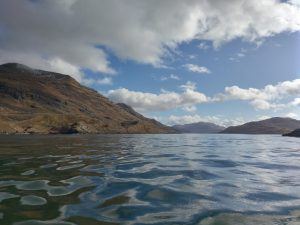
Early morning sampling on the west of Ireland. How much groundwater is in there?
-
My Typical Day
In my researcher life, have two kinds of typical days 🙂 Either I am in the west coast of Ireland and collecting water from the sea, rivers, springs and wells or I am in Dublin, in my office and lab, analysing and interpreting these samples. Click on "read more" to find out more about my days as a water scientist!
-
Read more
I go regularly on the west coast of Ireland, and rent boats from fishermen or people growing mussels or salmon there. They help me and the other researchers I work with, guiding us through the places we go to. Thanks to them, I can take water samples and water bags in the surface and deep waters (sometimes 40 m deep!).
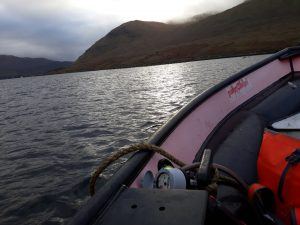
Sampling from a boat
After this, on each bay I visit, I fill bottles every two or three hours during 24 hours. Hard work, and I do not sleep much, as I must analyse some of them as soon as possible in between! One day after several of them, I was so tired that something i was holding fell into the water and I jumped in the sea to take it back! Luckily, I am a good swimmer…
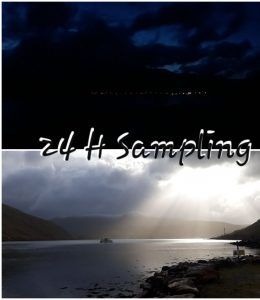
The 24h sampling… the same place looks quite different 12hours later^^.
I also sample rivers well and springs in the area, and then come back to my laboratory in Dublin with hundreds of small containers filled with water and analyse them. Most of the time it takes me month to do all of them! Now this is my last year of research and I start to see the results of this effort.
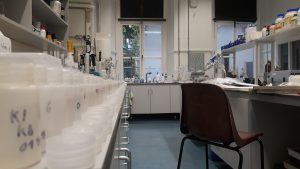
A long line of sample to analyse!!
When in Dublin, I go to my office and laboratory every day and try to understand how the life and chemistry of the Irish bays change depending on the seasons, and how groundwater affects the sea. With my two colleagues and my supervisor, we discuss about what we collected and decide if it is necessary to come back on the west for more samples. All of this to help making better decisions to protect the sea for the future.
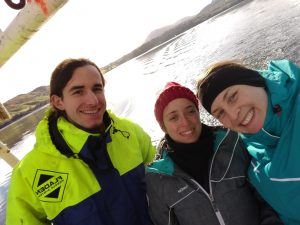
Me (left) and my team mates (right). Two amazing researchers from Italy and Ireland.
I also had the chance to go on a week research cruise on board of the Celtic Voyager (a boat of the Marine Institute). A week on board of sheep with a crew and cook to help us. A really good experience!
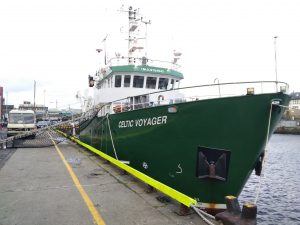
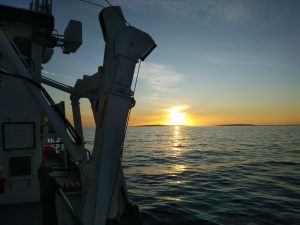
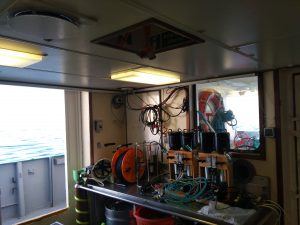
This was where i was working when at sea on the Celtic Voyager. At some point the sea was so wavy that we had to close the doors to avoid having waves inside. You can also see two RaDECC on this picture. One of the special instruments i use. At this time these were the only one in Ireland!
-
What I'd do with the prize money
Wouldn’t it be great if science and environment protection was something that everyone/ more people could do? That’s my dream! To make it possible for those interested in listening to, observing and describing how our environment changes. I would use the money to buy equipment to allow citizens that wish to learn or contribute to basic water monitoring, or teachers that wish to initiate students about how to measure different things in the water, to be able to do so (ex: temperature, salinity, nutrients).
-
My Interview
-
How would you describe yourself in 3 words?
Curious, open minded, kind.
What did you want to be after you left school?
An archeologist, then a geologist, then a water scientist. Finally, I became the last two ones, in that order^^
Were you ever in trouble at school?
When i was a kid, i punched a person that was looking for trouble every day with me and others, and broke his teeth... Clearly there are better ways to solve a conflict. We live and learn.
Who is your favourite singer or band?
Guitar players in Dublin pubs are the greatest:) Ye Vagabonds for instance! They are able to create a great atmosphere when they play somewhere.
What's your favourite food?
A carvery shared with friends!
What is the most fun thing you've done?
Scuba diving on a shipwreck at 40 m depth. It felts like being in Titanic.
If you had 3 wishes for yourself what would they be? - be honest!
Keep exploring life and science, have a work that I love and that allows to live decently, close to my famillly, girlfriend and friends.
Tell us a joke.
Teacher: "What can we do to stop water pollution?" Little Johnny: "Stop taking baths?"
-
-
Work photos:
